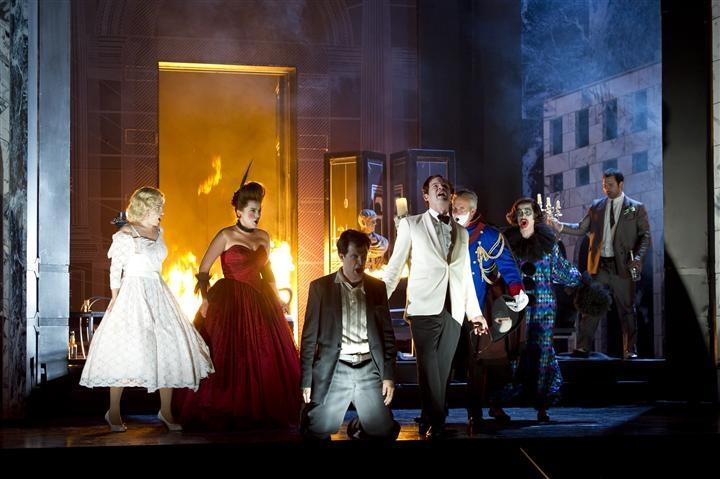It seems somehow wrong to come away from a Don Giovanni feeling a bit noncommittal about the whole thing. It’s the sort of opera that should raise you from your seat – that should fire and inspire – but this performance, directed by Jonathan Kent, never truly got off the ground. The set – a sort of Rubik's Cube of a building designed by Paul Brown that opened in ever more ingenious ways, and morphed from chapel to party house to graveyard – was clever and satisfying and mirrored the steady disintegration of the characters as we progressed. But without the intensity and the drama from these characters, it was rather wasted.
Gerald Finley was a toff of a Don Giovanni, who wouldn’t have been out of place lounging across the Glyndebourne lawns and dragging off a lady or two to have a quick romp with in the bushes. Of course, we all know that Don Giovanni has his arrogant bounder side, but there has to be a bit more swagger, a bit more sex, a bit more inherent loutishness there too – I bet the larger part of the Don’s 1,003 Spanish conquests were from the equivalents of Magaluf and Torremolinos, and he wouldn't have got those wearing a white DJ. Finley’s rather preppy look suggested he’d be happier picking up freshers at Oxford.
As with the appearance, so with the voice. There’s a natural lightness to Finley’s voice that can be very attractive, but it didn’t do it for me last night – there just wasn’t the gravel there to grip as it might have done. In contrast, Leporello, played by Luca Pisaroni, was rather stylish in his haplessness, with a roguish air that was distinctly appealing and a tone that suited his more cagey character well. The other performers were all decent, but I wasn’t left rocked by any of them. Kate Royal was a disappointment as Donna Elvira, as was William Burden as Don Ottavio: the former seemed to have left her voice at home, the latter was unmemorably beige. Anna Samuil (Donna Anna) was considerably more gutsy, with a voice that carried much better than the others, and Anna Virovlanssky was pleasantly and cutely coquettish as Zerlina.
Underpinning this was the Orchestra of the Age of Enlightenment, directed by Vladimir Jurowski. There were some pleasantly rich sounds emanating from the pit from time to time, and there was plenty of depth to be found in the playing, though it felt extremely serious - lacking in essential sparkle and wit. A number of timing issues when the orchestra was positioned around the stalls created the occasional aural equivalent of watching 3D television without the glasses.
The thing is, this Don Giovanni wasn’t bad, it just wasn’t brilliant, and you rather hope for brilliant at Glyndebourne. I’m not sure what they need to do to provide that extra zip and zing, but I’m sure it wouldn’t take much. Let’s hope they find it before the end of the run.















Add comment